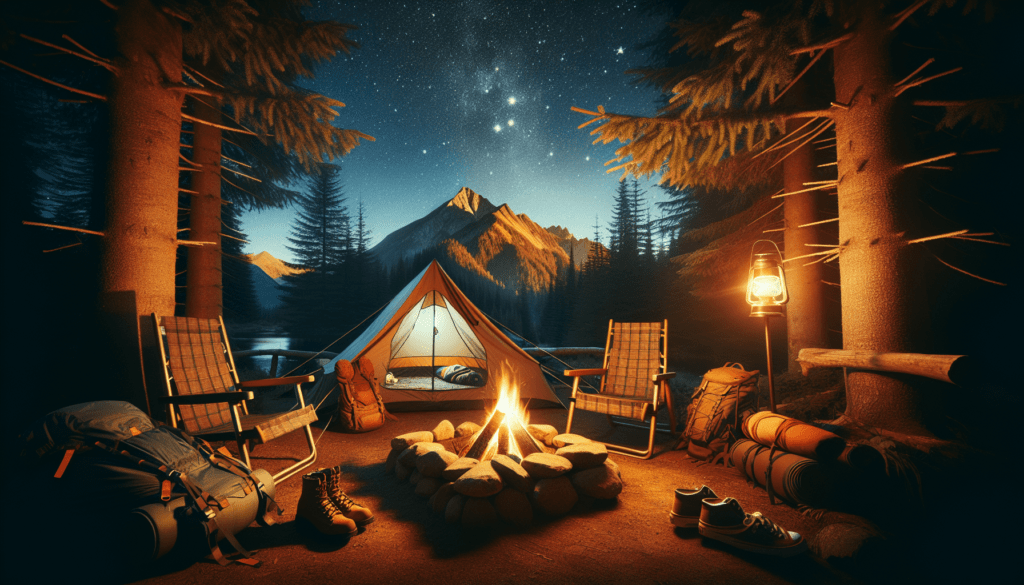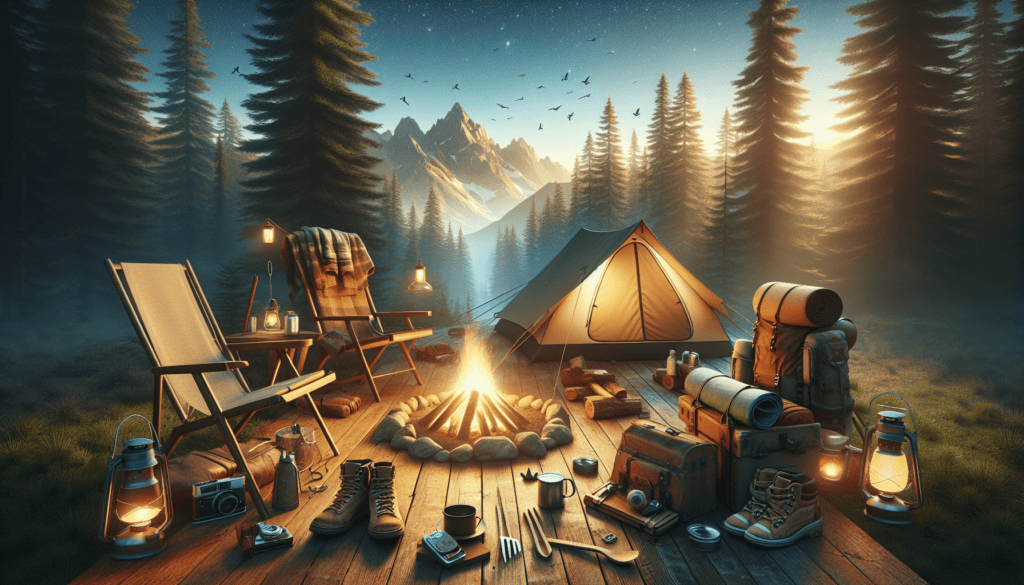Have you ever wondered how to make your camping trips both fun and safe? Planning a successful camping adventure requires a blend of anticipation, preparation, and attention to detail. Whether you are a seasoned outdoor enthusiast or a first-time camper, mastering the art of camping can significantly enhance your experience.
Choosing the Right Campsite
The foundation of a successful camping trip lies in selecting the perfect campsite. The location you choose will have a direct impact on your overall experience.
Evaluating Campsite Features
Consider the following features when evaluating potential campsites:
| Feature | Importance |
|---|---|
| Accessibility | Ensure the campsite is accessible by your mode of transport. |
| Amenities | Check for essential amenities like toilets, showers, and potable water. |
| Wildlife | Be aware of the local wildlife and any necessary precautions. |
| Terrain | Look for level ground for pitching tents and safety from potential hazards. |
Regulations and Permits
Many camping areas require permits or have specific regulations to follow. Always check with local authorities or park management about necessary permits, fire restrictions, and any other rules that may apply to your chosen location.
Packing Essentials
Packing efficiently and comprehensively is another crucial aspect of camping. Your packing list will vary depending on the location, duration of stay, and time of year.
Shelter and Bedding
Your shelter and bedding choices will dictate how comfortably you sleep during your trip.
- Tent: Select a tent appropriate for the season and number of campers.
- Sleeping Bag: Choose a sleeping bag with the right temperature rating.
- Sleeping Pad or Air Mattress: These provide insulation and cushioning.
Clothing and Footwear
Camping environments can be unpredictable. Prepare for varying conditions with these staple items:
- Base Layers: Moisture-wicking and thermal layers are essential.
- Mid Layers: Fleece jackets or wool sweaters for insulation.
- Outer Layers: Windproof and waterproof jackets.
- Footwear: Durable and comfortable hiking boots are a must.
- Accessories: Hats, gloves, and extra socks can be lifesavers.
Cooking and Food Storage
Efficiency in the kitchen area can enhance your overall camping experience.
- Cooking Stove: A portable stove with fuel.
- Cookware: Pots, pans, and utensils.
- Cooler: For perishable foods.
- Non-perishables: Canned goods, dried fruits, nuts, and granola bars.
Safety and Health
Safety should always be a priority. Equip yourself with:
- First Aid Kit: Include insect repellent, bandages, and antiseptic.
- Navigation: Maps, compass, or GPS devices.
- Emergency Supplies: Whistle, multi-tool, and flashlight.

Setting Up Camp
Properly setting up your campsite can make a significant difference. It’s crucial to organize your site for comfort, efficiency, and safety.
Tent Placement
Select a flat, elevated spot away from potential hazards like rivers which may flood. Ensure the area is free from rocks and debris.
Kitchen Setup
Your cooking area should be downwind from your sleeping area and at least 200 feet away to avoid attracting wildlife. Use bear-proof containers if in bear country.
Campfire Safety
If campfires are allowed, follow these guidelines:
- Clear a 10-foot diameter around the fire pit.
- Keep water and a shovel nearby.
- Never leave a fire unattended.
Outdoor Ethics
Respecting nature ensures that you and others can continue to enjoy the great outdoors.
Leave No Trace
Follow the Leave No Trace principles:
- Plan Ahead and Prepare: Ensure your actions are considerate of the environment and others.
- Travel and Camp on Durable Surfaces: Stay on trails and camp in established areas.
- Dispose of Waste Properly: Pack it in, pack it out.
- Leave What You Find: Preserve the past by leaving rocks, plants, and artifacts as you find them.
- Minimize Campfire Impact: Use a lightweight stove for cooking to reduce the need for fires.
- Respect Wildlife: Observe animals from a distance.
- Be Considerate of Other Visitors: Maintain courteous behavior to preserve the outdoor experience for everyone.

Activities and Recreation
Carefully plan activities to ensure they are safe and enjoyable for all participants.
Hiking
Wear appropriate footwear and bring plenty of water. Stay on marked trails and inform someone of your route and expected return time.
Water Activities
Follow these guidelines for water-related activities:
- Swimming: Swim in designated areas only, and always follow posted guidelines.
- Boating: Wear a life jacket and follow local regulations.
Wildlife Observation
Maintain a safe distance from wildlife and never feed animals. Use binoculars to observe without disturbing.
Weather Preparedness
Weather can change rapidly in the outdoors. Always keep an eye on the forecast and prepare for unexpected conditions.
Rainy Conditions
Bring waterproof gear such as rain jackets and covers for your packs. Make sure your tent is rain-proof and your sleeping area stays dry.
Hot Weather
In hot weather, stay hydrated, wear sunscreen, and plan outdoor activities during cooler times of the day.
Cold Weather
Layer up with appropriate clothing and use a cold-weather-rated sleeping bag. Being prepared can significantly improve your comfort and safety in cold conditions.
Expert Advice
Consult resources and individuals who have significant camping experience for additional tips and tricks. Engaging with the community can enhance your knowledge and preparation.
Local Rangers and Park Officials
Park rangers can provide updated information on trail conditions, wildlife behavior, and any recent changes in regulations.
Camping Communities and Forums
Online forums and local community groups can be treasure troves of firsthand experiences, advice, and tips tailored to specific locations.
Books and Guides
Investing in quality camping guides can provide you with comprehensive information on best practices, checklists, and emergency protocols.
Common Camping Mistakes to Avoid
Learning from common mistakes can help you improve your camping experience.
Overpacking and Underpacking
Strike a balance by creating a checklist and sticking to it. Avoid bringing unnecessary items, but also ensure you have essentials for safety and comfort.
Ignoring Local Wildlife
Not being informed about local wildlife can be risky. Spend time learning about the animals in the area and how to secure your campsite.
Poor Food Storage
Improper food storage can attract wildlife. Use bear bags or containers and store food away from your sleeping area.
Neglecting Safety Measures
Always prioritize your safety by following guidelines and being prepared for emergencies. A well-stocked first aid kit and knowing basic first aid can be crucial.
Sustainable Camping
Practicing sustainability ensures that the natural beauty of camping sites is preserved for future generations.
Eco-Friendly Equipment
Invest in eco-friendly camping gear, such as biodegradable soap, solar-powered lanterns, and reusable utensils.
Responsible Waste Disposal
Always pack out what you pack in. Use biodegradable products wherever possible and dispose of waste in designated areas.
Supporting Conservation Efforts
Contribute to conservation efforts by supporting national parks and local initiatives. Donations and volunteering can make a significant impact.
Planning for Future Trips
Proper planning of your camping trips can make them more enjoyable and reduce last-minute stress.
Keep a Camping Journal
Documenting your trips can provide valuable insights for future adventures. Record what worked, what didn’t, and what to bring next time.
Regular Gear Maintenance
Regularly clean and maintain your camping gear. This can extend the life of your equipment and ensure it performs well on subsequent trips.
Seasonal Adjustments
Each season presents unique challenges and opportunities. Adapt your camping plans and packing lists according to the season to maximize your comfort and enjoyment.
By meticulously planning and preparing for your camping trips, you can enhance both safety and enjoyment. Following these comprehensive guidelines ensures a memorable and satisfying outdoor experience.
Support us! Wilderness gear Pro may earn a small commission from affiliate links in this article. Learn More

